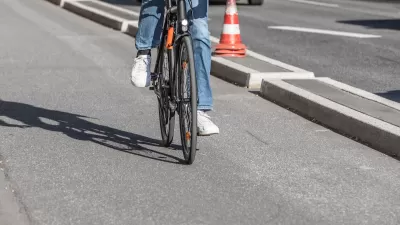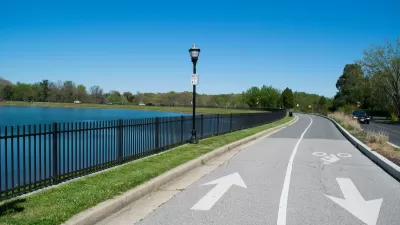Projects on roadways maintained by the state DOT will have to comply with Complete Streets requirements as part of a broader effort to reduce traffic deaths in the state.

The Maryland Department of Transportation (MDOT) issued a new, department-wide Complete Streets policy, signaling a renewed commitment to improving road safety for pedestrians and cyclists.
According to an announcement from MDOT, “the Complete Streets policy will ensure MDOT’s multi-billion-dollar capital program funds safe, complete streets for all Marylanders.”
Complete Streets requirements will apply to capital improvement projects, new or reconstructed streets connecting to MDOT rights-of-way, and “When there is an opportunity to improve safety for all users by applying proactive engineering safety countermeasures to resurfacing projects.”
The policy requires each MDOT mode or transportation type to develop strategies for implementation within the next six months “with the goal of increasing equitable access to the transportation network — from better transit connections to safer crossings.” It also focuses on driver education and traffic enforcement.
The statement notes, “The policy applies to new projects and is not retroactive for ones that have achieved 30% or more design and approval pursuant to the National Environmental Policy Act (NEPA) or that will achieve those milestones by December 1.”
FULL STORY: Maryland Transportation Secretary Wiedefeld Implements New Statewide Complete Streets Policy

Planetizen Federal Action Tracker
A weekly monitor of how Trump’s orders and actions are impacting planners and planning in America.

San Francisco's School District Spent $105M To Build Affordable Housing for Teachers — And That's Just the Beginning
SFUSD joins a growing list of school districts using their land holdings to address housing affordability challenges faced by their own employees.

The Tiny, Adorable $7,000 Car Turning Japan Onto EVs
The single seat Mibot charges from a regular plug as quickly as an iPad, and is about half the price of an average EV.

Trump Approves Futuristic Automated Texas-Mexico Cargo Corridor
The project could remove tens of thousands of commercial trucks from roadways.

Austin's First Single Stair Apartment Building is Officially Underway
Eliminating the requirement for two staircases in multi-story residential buildings lets developers use smaller lots and more flexible designs to create denser housing.

Atlanta Bus System Redesign Will Nearly Triple Access
MARTA's Next Gen Bus Network will retool over 100 bus routes, expand frequent service.
Urban Design for Planners 1: Software Tools
This six-course series explores essential urban design concepts using open source software and equips planners with the tools they need to participate fully in the urban design process.
Planning for Universal Design
Learn the tools for implementing Universal Design in planning regulations.
Smith Gee Studio
City of Charlotte
City of Camden Redevelopment Agency
City of Astoria
Transportation Research & Education Center (TREC) at Portland State University
US High Speed Rail Association
City of Camden Redevelopment Agency
Municipality of Princeton (NJ)





























